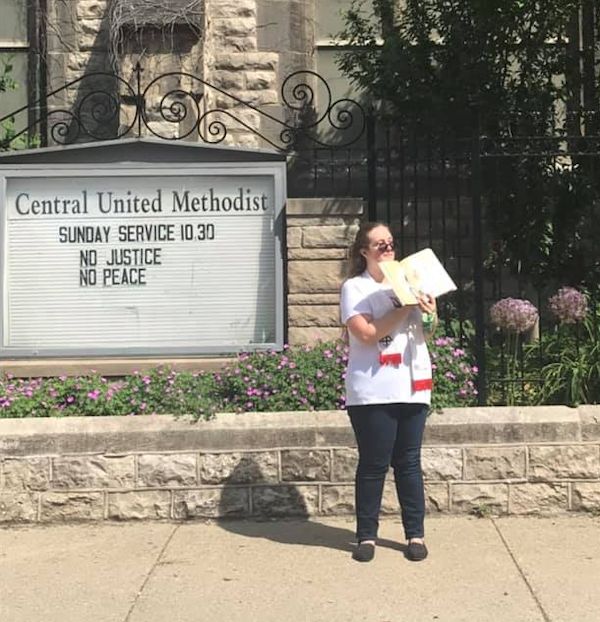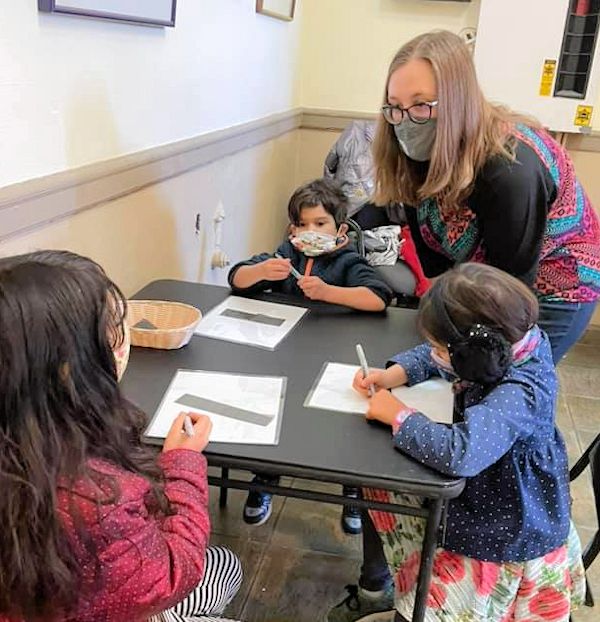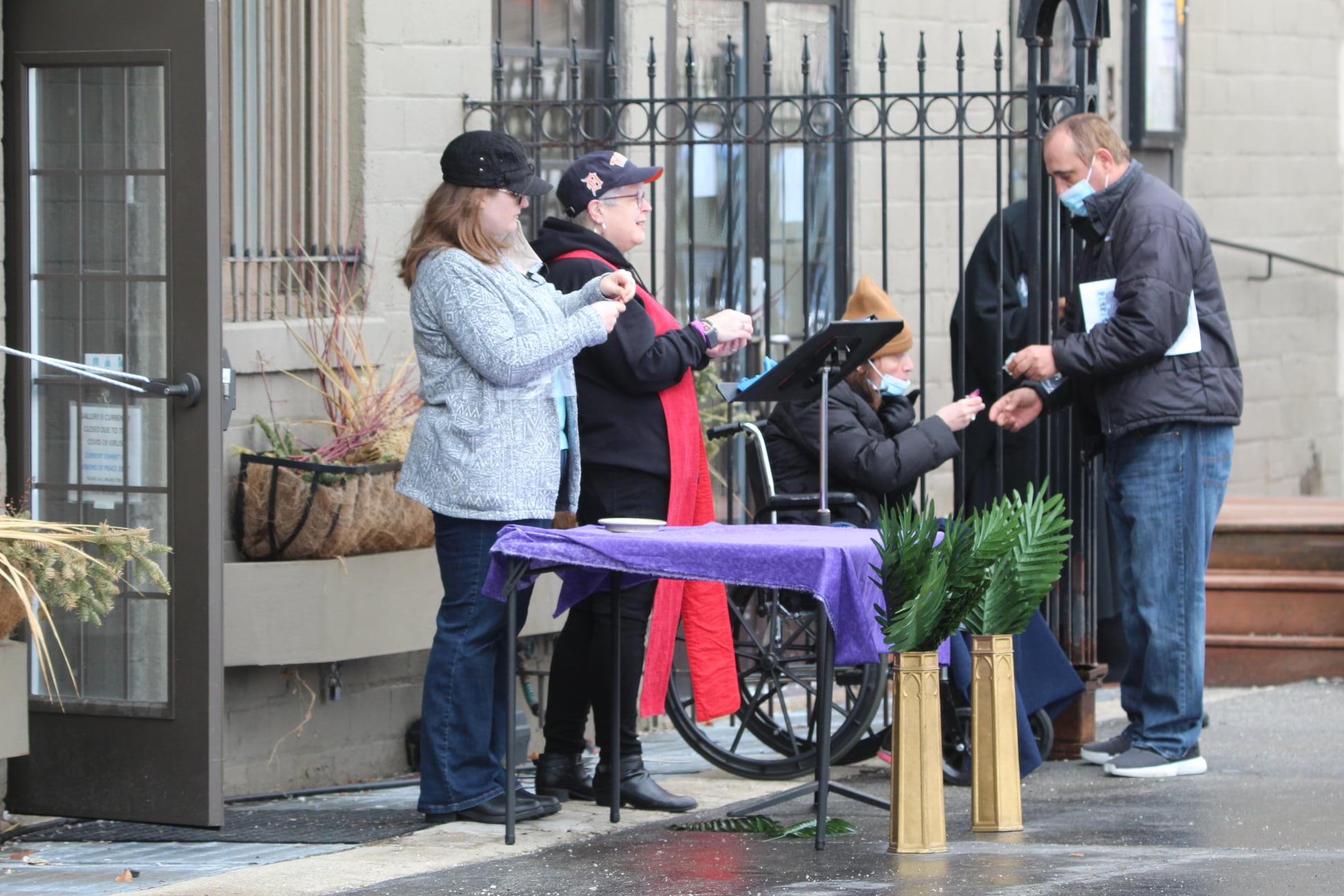Deaconess Anne Hillman is in ministry on the staff at Detroit Central UMC. She is one of four deaconesses currently serving in the Michigan Conference.
KAY DEMOSS
Senior Content Editor
United Methodist churchgoers know what an elder is, though most call him or her pastor. A little less familiar is the permanent deacon, a clergy role in the denomination since 1996. More extraordinary is the deaconess. What’s a deaconess, and what does she do?
The Office of Deaconess has been around since the 1888 General Conference, where it became a part of the regular organization of the Methodist Church. A pamphlet of that era described their function this way:
Trained and costumed women who offer themselves and are set apart for the service of the church. The work of the deaconess is to “nurse the sick both in hospitals and as private nurses. They visit from house to house, are missionary workers and pastor’s assistants. They have charge of missions in the poor quarters of the city. They are evangelists, traveling over the country as need arises. They work with children, both as caretakers in orphanages and as kindergarten and industrial teachers. They have charge of old people’s homes. They are gospel singers. Many are foreign missionaries. Some who have business talent are directing the affairs of Deaconess hospitals and other institutions. Some are editors, stenographers, and office helpers.

Clearly, the deaconess movement has a significant heritage. And that movement continues today, administered by the National United Methodist Women. Their website offers a contemporary profile of the time-honored role: “Deaconesses and Home Missioners are laywomen and laymen who God calls to be in a lifetime relationship in The United Methodist Church for engagement with a full-time vocation in ministries of love, justice, and service. Together we form a covenant community that is rooted in Scripture, informed by history, driven by mission, ecumenical in scope, and global in outreach.”
Deaconesses are guided and consecrated by the UMW and then commissioned by the bishop in whose area they serve, in settings approved by the UMW. Today, as yesterday, deaconesses
- alleviate suffering;
- eradicate causes of injustice and all that robs life of dignity and worth;
- facilitate the development of full human potential; and
- share in building global community through the church universal.
Formal process aside, perhaps we can best understand the role of deaconess by meeting some persons who have responded to that call.
We begin this series on Michigan Deaconesses by traveling to Detroit for a conversation with Anne Hillman.
MIfaith: How did you become aware of the ministry of the deaconess in The United Methodist Church? Please tell us about your call to that vocation.
Anne: I was working on a masters degree at Union Theological Seminary in New York City. I was contacted about a United Methodist young adult discernment weekend at Alma Mathews House in the city. At the time, I wasn’t sure if I would continue in academia by applying to PhD programs or not, and I was curious about the different avenues for lay ministry within the church. At this weekend event, we were introduced to the Global Mission Fellows program and the Office of Deaconess and Home Missioner. Listening to Deaconess Becky Louter speak about the deaconess community and the understanding of ministry and mission held by the community, I realized that this was where I fit in the church. I had discerned that I was called to study theology and interreligious dialogue; that my faith called me to a greater understanding of the religious other and to efforts to educate other people of faith. With the Office of Deaconess and Home Missioner, I found a community that would affirm my call to ministries of teaching and dialogue while offering me support to do those ministries.
MIfaith: How did you prepare for service as a deaconess, and how have you found yourself strengthened within the community of deaconesses and home missioners?
Anne: I prepared for my deaconess service by getting a PhD in Constructive Theology & Theological Ethics at Boston University School of Theology. I took the required courses through the Office of Deaconess and Home Missioner. I studied Christian theology in-depth, took courses on interreligious dialogue, and became a teaching assistant for various classes. The deaconess community has strengthened me through friendship and mentorship and provides me opportunities to give theological instruction to other deaconesses/home missioners and groups of United Methodist Women. This community has nurtured my growth as a theologian and encouraged me to use the knowledge and skills I’ve developed in service to the deaconess/home missioner community.

MIfaith: How are you living out your calling in your current ministry at Detroit Central?
Anne: I am serving the church as the Director of Children, Youth, & Family Ministries. I am able to live out my calling as a teacher through faith formation programming for all ages of the congregation. This congregation is very justice-focused, so being part of this faith community allows me to fulfill my deaconess calling to work for love, justice, mercy. I will also be a co-instructor for the next Theology of Mission course of the Office of Deaconess and Home Missioner. This course is required of all deaconess and home missioner candidates to assist them in understanding the view of mission and ministry held by the deaconess community and discern whether or not they are called to become part of that community.
MIfaith: What would you say to others who are considering service in the UMC? What encouragement would you give to those considering consecration and commissioning as a deaconess?
Anne: All Christians are called to participate in the ministry of Christ at different points in their lives and in different ways. Some Christians are called to devote themselves full-time to ministry, and some of that ministry is done by laypeople and some by clergy. If you feel called to devote your life to Christian ministries of love, justice, and service, and you don’t feel a call to ordination, then consecration as a deaconess or home missioner may be right for you. There are so many ways to live out a calling to ministry, and the deaconess/home Missioner community is here to help you discern that call and support you in your particular ministry. You do not need to be ordained to serve God and live out a call to ministry. Being a deaconess or home missioner means you are consecrated to a lifetime of full-time lay ministry. If you feel called to the work you do because you feel God has led you there, then I encourage you to learn about the Office of Deaconess and Home Missioner.
Next time we will meet another of the deaconesses active in The Michigan Conference, Michelle White. She serves 5Loaves2Fish Northern Michigan with her husband Bill, who is a Home Missioner.
Last Updated on October 30, 2023

